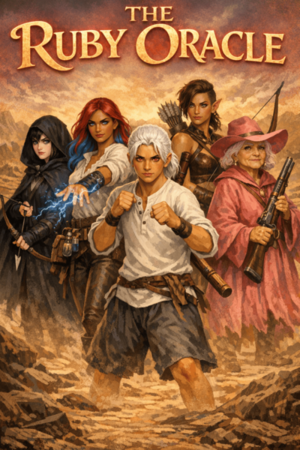Chapter 5:
Behind Kinahrejo’s Quietude
The Third Rain
The morning sky over Kinahrejo was clear, adorned only by wisps of clouds reluctant to scatter. The wind carried the scent of damp earth left behind by last night’s rain. Small birds hopped between the branches of waru trees, and in the distance, the faint sound of cowbells echoed from the fields.
Hasan stood at the threshold of the stilt house he shared with Hasuna, his eyes scanning the village. Kinahrejo was a small settlement surrounded by forests and fields—shielded from the chaos of the world, but never truly silent. To Hasan, this place resembled a living painting: full of natural color, and meaning that slowly unfolded with each passing day.
The houses in the village were built from teak and bamboo, raised on wooden stilts to protect against dampness and wild animals. Their roofs were made of black palm fiber, and the small windows had no glass. There were no electric cables, no machine sounds. Only the gentle clinks of wooden tools and the laughter of children.
Every morning, the villagers began their day before sunrise. Women carried woven baskets filled with tubers and forest leaves. The men prepared hunting tools or worked on small plots of land with simple hoes. And in the midst of it all, Hasan realized: though this world looked simple, life here demanded strength far greater than life in the modern city.
After several weeks of living there, Hasan began training under the guidance of a spiritual and physical mentor named Ozcan. The old man was muscular, with long white hair tied back with a red cloth, and eyes so sharp they seemed to pierce through thoughts.
"Your body is weak. But your will can be sharpened," Ozcan said the first time he met Hasan.
Training started from the most basic level—not with stances or swords, but something deeper: breathing, body balance, and emotional control.
"This world acknowledges two paths of power," Ozcan explained one morning as they sat by a river.
"First, physical strength—force, endurance, speed, and combat skill. That can be built through hard work. Second, spiritual strength—the ability to sense and direct the life energy that flows around us: the energy of God."
Hasan frowned. “The energy of God?”
Ozcan nodded. “In this world, we call it that. It exists in water, earth, air, and fire. It can be felt, guided—even pleaded with. But only those with a clear heart can use it.”
From then on, Hasan trained daily. He ran around the hills at sunrise, lifted stones for strength, and balanced on bamboo poles. But the hardest part wasn’t physical.
The hardest part was sitting still—trying to feel the divine energy around him. Breathing in silence, syncing with nature, releasing anxiety. More often than not, Hasan failed. His mind drifted to the past—to Karin, to his world, to the loss that still ached.
But he kept trying.
His body began to grow stronger. His hands no longer blistered when hauling wood, his legs no longer trembled on long walks. But more than that, something deeper stirred in him—a quiet presence, calming yet unfamiliar.
Meanwhile, Hasuna was growing in a different way. The boy adapted quickly. In the morning, he helped the village women pound spices in the kitchen. By midday, he played with local children in the fields. In the evening, he learned about forest herbs and folktales from the elders.
"Your son is bright," one village woman told Hasan. "He memorizes quickly, asks many questions—and is polite. Rare for an outsider."
Hasuna also began learning to write using charcoal and wooden boards. It was Karin who taught him. Sometimes, the three of them sat together under a large banyan tree—Hasan practicing his breathing, Hasuna copying letters, and Karin reading from palm leaf manuscripts.
Hasan quietly cherished those moments. In the midst of this foreign world, they were slowly crafting a new routine. No longer haunted by fear of the third rain. No longer rushing to return.
One afternoon, after finishing his training, Hasan sat on a hilltop. From there, he could see all of Kinahrejo: the little homes, terraced fields, the shimmering silver river, and forests wrapped in soft mist.
Ozcan joined him.
"You know," he said, "this world has changed much. Once, spiritual strength was held in the highest regard. But now, many choose the path of physical strength—because it yields faster results. But fast doesn’t mean strong."
Hasan nodded. “I want to learn both.”
Ozcan smiled. “That is a long path. But if you endure… you could become something significant in this world.”
Hasan looked at his roughening palms. “I don’t want to be great. I just want to be strong enough… to protect Hasuna. And maybe… to protect her too.”
Ozcan nodded slowly. “Then don’t stop.”
That night in the kitchen, Hasuna eagerly shared how he had learned to identify poisonous plants and edible ones.
“Sis Karin said, crush the leaves first—if it smells fishy, don’t eat it!” he said, demonstrating.
Hasan smiled. “You’re learning a lot, huh?”
Hasuna nodded proudly. “I also helped make medicine for wounds. I want to be a healer! Or a swordsman! Or both!”
Hasan ruffled his son’s hair. “You can be whatever you want.”
And in his heart, he knew: the boy was starting to find his own world. Maybe… this place could become a home they never imagined.
Weeks passed.
Hasan could now climb trees quickly, parry Ozcan’s staff strikes, and meditate for an hour straight. He had yet to move divine energy, but at times he felt like it brushed against him—a warmer wind, a slight vibration when he touched the earth.
One night, the rain came again. Hasan sat on the porch, watching the downpour, remembering the fearful nights of the first rain.
Now, the rain meant something else.
It was no longer a harbinger of destruction. But perhaps… the beginning of something new.
Karin sat beside him, bringing two cups of warm tea made from dried leaves.
“You look different,” she said.
Hasan turned. “Older?”
Karin smiled. “Calmer.”
They sat in silence, listening to the patter of rain on the roof.
“Sometimes,” Karin said softly, “I wonder… if you were meant to come here. Not just by accident.”
Hasan didn’t reply. But deep inside, a small part of him started to believe.
And that night, under gentle rain, in a small village called Kinahrejo, a father and son slowly rediscovered the meaning of life—through foreign soil, relentless training, and the kindness of unfamiliar hands that now felt like family.
This world might be harsh, but their hearts were growing stronger in a gentle way: through perseverance, gratitude, and hope that blossomed slowly.
And from the top of the hill, the parallel world felt more real than any dream.




Please sign in to leave a comment.